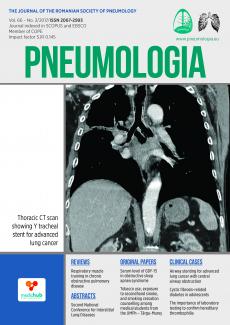General reviews
Inhaled corticosteroids in COPD and the risk of pneumonia
Mimi Nitu, Diana Medregoniu, Mihai Olteanu, Andreea Golli, Madalina Olteanu, Alin Maceseanu, Robert MedregoniuInhaled corticosteroids in COPD and the risk of pneumonia
Concern is continuing about increased risk of pneumonia in patients with chronic obstructive pulmonary disease (COPD) who use inhaled corticosteroids. The aim of this work is to present a few results from the literature about this problem.
Key words: inhaled corticosteroids, COPD, pneumonia
Peanut allergy
V. TurcanuPeanut allergy
Peanut allergy currently affects around 1% of the UK and US paediatric population and represents a major healthcare concern because it is outgrown in less than 20% of cases and is a major cause of anaphylaxis. Its main symptoms, triggered by peanut ingestion, are cutaneous (urticaria, erythema, angioedema), gastrointestinal (abdominal pain, vomiting, diarrhoea), respiratory (wheezing, dyspnoea) and cardiovascular (hypotension, arrhythmia, shock). The usual onset of symptoms occurs soon after peanut ingestion (minutes to hours); however some patients have biphasic reactions, with exacerbations occurring up to 8 hours later.
Peanut allergy diagnostic is based mainly upon the medical history (preferably including a diet diary and elimination diets), skin testing, peanut-specific IgE measurement and ideally a peanut oral challenge. Peanut allergy management includes monitorisation and education for avoiding peanut-containing foods and for recognising and treating anaphylactic episodes (self-injectable adrenalin and rapid-acting antihistamines). In the past, anti-IgE antibodies were shown to decrease the risk of anaphylaxis by reducing the allergic patients' reactivity to peanuts.
Recent investigations, driven by the need to develop efficient treatment and prevention strategies for peanut allergy, suggest that oral immunotherapy with peanuts, although exposing the patients to significant risk, may represent a promising therapeutic approach.
Furthermore, contrary to the general view that peanut avoidance in infants could prevent peanut allergy, a recent study shows that the opposite may be true as early consumption of peanuts in infancy is associated with a low prevalence of peanut allergy.
Key words: allergy, peanut, anaphylaxis




 Inhaled corticosteroids in COPD and the risk of pneumonia
Inhaled corticosteroids in COPD and the risk of pneumonia